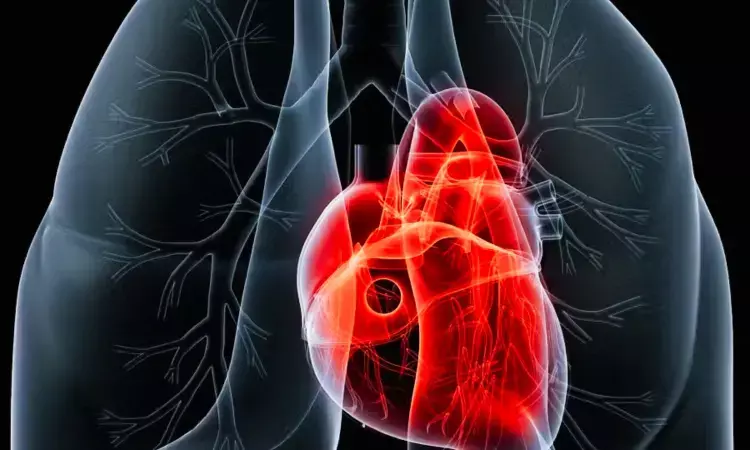- Home
- Medical news & Guidelines
- Anesthesiology
- Cardiology and CTVS
- Critical Care
- Dentistry
- Dermatology
- Diabetes and Endocrinology
- ENT
- Gastroenterology
- Medicine
- Nephrology
- Neurology
- Obstretics-Gynaecology
- Oncology
- Ophthalmology
- Orthopaedics
- Pediatrics-Neonatology
- Psychiatry
- Pulmonology
- Radiology
- Surgery
- Urology
- Laboratory Medicine
- Diet
- Nursing
- Paramedical
- Physiotherapy
- Health news
- Fact Check
- Bone Health Fact Check
- Brain Health Fact Check
- Cancer Related Fact Check
- Child Care Fact Check
- Dental and oral health fact check
- Diabetes and metabolic health fact check
- Diet and Nutrition Fact Check
- Eye and ENT Care Fact Check
- Fitness fact check
- Gut health fact check
- Heart health fact check
- Kidney health fact check
- Medical education fact check
- Men's health fact check
- Respiratory fact check
- Skin and hair care fact check
- Vaccine and Immunization fact check
- Women's health fact check
- AYUSH
- State News
- Andaman and Nicobar Islands
- Andhra Pradesh
- Arunachal Pradesh
- Assam
- Bihar
- Chandigarh
- Chattisgarh
- Dadra and Nagar Haveli
- Daman and Diu
- Delhi
- Goa
- Gujarat
- Haryana
- Himachal Pradesh
- Jammu & Kashmir
- Jharkhand
- Karnataka
- Kerala
- Ladakh
- Lakshadweep
- Madhya Pradesh
- Maharashtra
- Manipur
- Meghalaya
- Mizoram
- Nagaland
- Odisha
- Puducherry
- Punjab
- Rajasthan
- Sikkim
- Tamil Nadu
- Telangana
- Tripura
- Uttar Pradesh
- Uttrakhand
- West Bengal
- Medical Education
- Industry
Intermediate- to long-term amiodarone use safe and may not increase mortality risk in AF patients

Israel: Low-dose amiodarone in the contemporary atrial fibrillation (AF) population was associated with a lower risk of all-cause mortality in the absence of a substantial increase of interstitial lung disease (ILD) and primary lung cancer (PLC) risk, a nationwide Israeli study has shown.
"Constant exposure to low-dose amiodarone was associated with a trend towards increased ILD risk (15%-45%) but a clinically negligible change in absolute risk (maximum of 1.8%), no increased PLC risk, and a lower risk of all-cause mortality," reported Gal Tsaban, University of the Negev Beersheva, Israel, and colleagues.
The findings published in European Heart Journal highlight the safety of intermediate- to long-term amiodarone use, without evidence of increased mortality risks.
Amiodarone-related interstitial lung disease is the most severe adverse effect of treatment with amiodarone. Most studies on amiodarone-related ILD are derived from periods when amiodarone was given at higher doses than currently used. Therefore, the research team aimed to determine the association between constant exposure to low-dose amiodarone and the risk of ILD, PLC, or all-cause mortality among contemporary AF patients. For this purpose, they conducted a nationwide population-based study among patients with incident atrial fibrillation between 1999 and 2021.
The researchers matched amiodarone-exposed patients 1:1 with controls unexposed to amiodarone based on sex, age, ethnicity, and AF diagnosis duration. The final cohort comprised only matched pairs where amiodarone therapy was consistent throughout follow-up. Inverse probability treatment weighting (IPTW) modelling and directed acyclic graphs were used. Patients with either prior primary lung cancer or ILD were excluded. The primary outcome of the study was determined as the ILD incidence. The secondary endpoints were PLC and death.
The final cohort included 6039 patients exposed to amiodarone who were matched with unexposed controls. The median age was 73.3 years, and 51.6% were women.
The study led to the following findings:
- After a mean follow-up of 4.2 years, ILD occurred in 2.0% of the patients.
- After IPTW, amiodarone exposure was not significantly associated with ILD [hazard ratio (HR): 1.45].
- There was a trivial higher relative risk of ILD among amiodarone-exposed patients between Years 2 and 8 of follow-up [maximal risk ratio (RR): 1.019].
- Primary lung cancer occurred in 97 patients.
- After IPTW, amiodarone was not associated with PLC (HR: 1.18).
- All-cause death occurred in 18.1% of patients.
- After IPTW, amiodarone was associated with reduced mortality risk (HR: 0.65). The results were consistent across a variety of sensitivity analyses.
"Our findings showed that constant exposure to low-dose amiodarone was associated with clinically negligible, raised risk of ILD, no increased PLC risk, and lower risk of all-cause mortality," the researchers wrote.
"The results were consistent across several sensitivity analyses," they concluded.
Reference:
Tsaban, G., Ostrovsky, D., Alnsasra, H., Burrack, N., Gordon, M., Babayev, A. S., Omari, Y., Kezerle, L., Shamia, D., Bereza, S., Konstantino, Y., & Haim, M. Amiodarone and pulmonary toxicity in atrial fibrillation: A nationwide Israeli study. European Heart Journal. https://doi.org/10.1093/eurheartj/ehad726
Dr Kamal Kant Kohli-MBBS, DTCD- a chest specialist with more than 30 years of practice and a flair for writing clinical articles, Dr Kamal Kant Kohli joined Medical Dialogues as a Chief Editor of Medical News. Besides writing articles, as an editor, he proofreads and verifies all the medical content published on Medical Dialogues including those coming from journals, studies,medical conferences,guidelines etc. Email: drkohli@medicaldialogues.in. Contact no. 011-43720751


